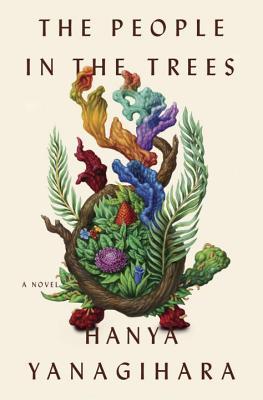Publisher: Doubleday. August 2013.
Pages: 384
Genre: Literary Fiction
Source: Publisher
First Line: March 19, 1995 Renowned Scientist Faces Charges of Sexual Abuse
ADD TO GOODREADS
BUY FROM INDIEBOUND
BUY FROM BOOK DEPOSITORY
In 1950, a young doctor called Norton Perina signs on with the anthropologist Paul Tallent for an expedition to the remote Micronesian island of Ivu'ivu in search of a rumored lost tribe. They succeed, finding not only that tribe but also a group of forest dwellers they dub "The Dreamers," who turn out to be fantastically long-lived but progressively more senile. Perina suspects the source of their longevity is a hard-to-find turtle; unable to resist the possibility of eternal life, he kills one and smuggles some meat back to the States. He scientifically proves his thesis, earning worldwide fame and the Nobel Prize, but he soon discovers that its miraculous property comes at a terrible price. As things quickly spiral out of his control, his own demons take hold, with devastating personal consequences. - Goodreads
1. // It's a book within a book.
Maybe it's just me, but I'm delighted whenever this happens. If you're a little hesitant, fear not. This is no gimmick. There is no better way this strange story could be told. The book is framed as Norton Perina's memoir that he's writing from jail. The introduction, editing, and footnotes are done by his friend, Ronald. At one point, Norton Perina says about his life:
...I have found that contemplating the events of that year becomes tolerable only when I consider them as things that happened long ago and to someone else--some series of misfortunes and tragedies that befell someone I once admired and had read about in a dusty book in a grand, stone-floored library somewhere far away, where there was no sound, no light, no movement but for my own breath, and my fingers clumsily turning the rough-cut pages.That's what reading this book feels like. And it's a glorious feeling.
2. // There are unreliable narrator(s).
Remember Ronald who edits the memoir? He admits to being biased toward Norton Perina, as they're friends, and he also says that he has edited things out that seem unnecessary. That paired with a main character whose only focus seems to be success and who is in jail for a horrible crime he says he didn't commit? You always have to be on your toes as you read this story. Not all is as it seems.
3. // There are some disturbed characters.
As Yanagihara proved this year with A Little Life, she can take you to some dark places in her books. And the darkest places are within the minds of her characters, which she creates so richly and thoughtfully. The complexity of these people is revealed so subtly, it feels like you're discovering secrets as you read. Every revelation about a character is well placed and well timed. Norton Perina is a troubling individual on so many different levels and I love that.
4. // Hanya Yanagihara's writing is so immersive.
I really don't know how she does it. I mean a lot of it has to do with the context of this being a memoir that you're reading, but you get completely immersed in the story and the characters she has created. Her written landscaping of this fictional island is so in depth and atmospheric, you can feel the heat and darkness and claustrophobia of the jungle. None of the weirder plot points took me out of the story at all; they only helped to suck me in.
5. // It's also really beautiful.
My arms cramped up from how many paragraphs I typed up. Because it's written as a memoir by a scientist with extensive footnotes, it looks and feels like it should be dense. I'm not going to say you can race through it in one sitting, but there was no point in this book that I was bored. Yanagihara's prose is so lyrical. I mean, look at this.
I stood periodically and listened to the dry palm fronds chattering against one another like bones, and to the ocean, its remorseless, lonely conversation with itself, a sound that—though I did not know it at the time—I would not hear again for months to come.
6. // Physical immortality is acquired through eating mystical turtles.
Ok, this isn't always criteria for me, but it's definitely a bonus. Despite how human the plot is, the fantastical elements really take it up a notch. The discovery of "The Dreamers" (the people who are 100+ years old, but incommunicable due to mental deterioration) is so intense. Not knowing how many more are in the jungle is more so. The tribe of islanders and their customs are fascinating. The folklore behind the turtles that provide physical immortality is so interesting to read. All of these strange elements adds a richness through its inventiveness and layering, and it only helps magnify the the real life issues: exploration, globalization, mortality, progress, ego, etc.
I don't want to say too much about Yanagihara's stunning debut novel. I just really want you to read it. Do you look for any of these things in the books you read?

